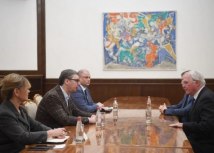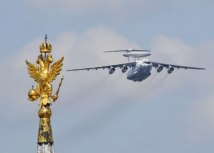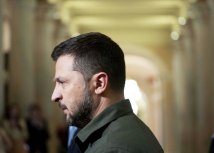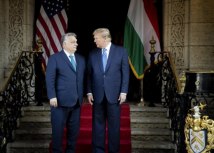Turkey's Kurdish TV hopes to win hearts and minds
The state-run Turkish Radio and Television's (TRT) new Kurdish-language channel, TRT-6, went on the air, RFE reports.
Source: RFEThe channel premiered with an image of the Turkish flag being hoisted to the sound of the country's national anthem on January 1.
Earlier the same day, Prime Minister Recep Tayyip Edrogan became the first Turkish leader to speak Kurdish publicly when he said, "May TRT-6 be beneficial."
Back in 2004, TRT began a weekly 30-minute Kurdish broadcast. The move was widely seen as a response to European Union pressure to strengthen the rights of the Kurdish minority.
But the 24-hour broadcasts go far beyond that.
Mustafa Akyol, a Turkish columnist and political commentator, says that the political establishment in his country appears to have realized that Turkey's obsession with being a "homogenous" nation - and the idea that the country should have one common "Turkish" culture - has backfired.
"The state has seen its mistake. And for a while, especially under the current government [of the] Justice and Development Party -- and thanks to [joining] the European Union process - the Turkish state has started to change its policy and embrace Kurdish citizens [along] with their identity," Akyol says.
"Having a Kurdish channel in TRT - its a very important thing. It would be unthinkable 10 years ago," he adds. "And I know that many Kurds are happy to see this."
Turkey's 15 million Kurds make up some 20 percent of the Turkish population. They live predominantly in the east and southeast along the Iranian, Iraqi, and Syrian borders. Currently, the Denmark-based Roj TV is the most popular station among Turkey's Kurds.
But Turkish officials consider the station to be a mouthpiece for the Kurdistan Workers Party (PKK) - a rebel group fighting for Kurdish autonomy since 1984 that Ankara, Washington, and the European Union have declared a terrorist organization.
Akyol says countering the message of Kurdish nationalist satellite channels such as Roj TV is one obvious reason the new Kurdish station was launched, because official attempts to stop people from watching the broadcasts failed.
He says the TRT programs will be aimed at providing "Kurdish broadcasts, which would not be supporting radical Kurdish nationalism and would be supporting a more unifying message."
But he sees deeper motives involved as Turkey moves toward greater democratization and its government and institutions also adjust to 21st-century realities.
"Now there is more media than there has ever been. More people are educated and the economy is integrated to the world. It is a much more diverse society and the state is trying to cope with that reality," Akyol says.
"And Turkey hopes to, first of all, win the hearts and minds of its Kurdish citizens, and also probably, it is trying to show that it is a real democracy."
But some leaders of Turkey's Kurdish minority are more skeptical of Ankara's motives.
"There is a need for a broadcasting policy that understands Kurds and meets their demands. We are carefully observing the process. We will see in time whether this is something that was initiated with the elections in mind," said Ahmet Turk, leader of the Democratic Society Party, which seeks Kurdish autonomy but participates in electoral politics.
The party boycotted the official launch ceremony and accused the ruling Justice and Development Party of using the channel as a mean to attract Kurdish voters ahead of upcoming elections in March.
Akyol, however, says that keeping in mind the diversity of Turkey's Kurds it is difficult to generalize about their views. He believes many will see the move as positive.
"It is true that all Kurds that I know - and they are all reported in the media - are happy to see that their identity is now being respected by the TV. Because the state they had in mind was one which banned their language, humiliated the language as a 'primitive' form of Turkish and so on. But they are all happy to see this," Akyol says.
"The PKK doesn't say much," he continues. "Maybe they might be not very happy, because their cause of uniting all Kurds for a program of radical nationalism might not benefit, from the fact that the state is now being open to Kurdish identity. But the Kurd on the street is happy to see that this has happened."
Experts in Turkey say the launch of TRT-6 is the first step in a comprehensive Turkish government strategy aimed at winning more Kurdish hearts and minds by addressing their genuine problems and thus trying to undercut the popular support base for the PKK and other radical nationalists.




